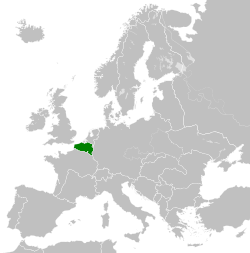Military Administration in Belgium and Northern France
| Military Administration in Belgium and Northern France | ||||||||||||
| Militärverwaltung in Belgien und Nordfrankreich | ||||||||||||
| Territory under German military administration | ||||||||||||
|
||||||||||||
|
||||||||||||
|
German and Italian occupation zones: the zone occupée, the zone libre,the zone interdites, annexed Alsace-Lorraine Luxembourg and Eupen-Malmédy, and the Military Administration in Belgium and Northern France.
|
||||||||||||
| Capital | Brussels | |||||||||||
| Languages |
Dutch French German |
|||||||||||
| Political structure | Military administration | |||||||||||
| Military Commander | ||||||||||||
| • | 1940 | Gerd von Rundstedt | ||||||||||
| • | 1940–1944 | Alexander von Falkenhausen | ||||||||||
| Administrator | ||||||||||||
| • | 1940–1944 | Eggert Reeder | ||||||||||
| Historical era | World War II | |||||||||||
| • | Established | 1940 | ||||||||||
| • | Disestablished | 1944 | ||||||||||
| Currency | Belgian franc | |||||||||||
|
||||||||||||
The Military Administration in Belgium and Northern France (German: Militärverwaltung in Belgien und Nordfrankreich) was an interim occupation authority established by Nazi Germany that included present-day Belgium and the French departments of Nord and Pas-de-Calais. The administration was also responsible for governing the zone interdite, a narrow strip of territory running along the French northern and eastern borders. It remained in existence until July 1944. Plans to transfer Belgium from the military administration to a civilian administration were promoted by the SS, and Hitler had been ready to do so until Autumn 1942, when he put off the plans for the time being. The SS had suggested either Josef Terboven or Ernst Kaltenbrunner as the Reich Commissioner of the civilian administration.
On 18 July 1944, the Military Administration was replaced by a civil one, led by the Gauleiter, Josef Grohé, who was named the Reichskommissar of the Reichskommissariat of Belgium and Northern France (Reichskommissariat Belgien und Nordfrankreich)
The Nazi administration was assisted by fascist Flemish, Walloon, and French collaborationists. In binational Belgian territory, the predominantly French region of Wallonia, the collaborationist Rexists provided aide to the Nazis while in Flemish-populated Flanders, the Flemish National Union supported the Nazis. In Northern France, Flemish separatist tendencies were stirred by the pro-Nazi Vlaamsch Verbond van Frankrijk led by priest Jean-Marie Gantois.
...
Wikipedia




